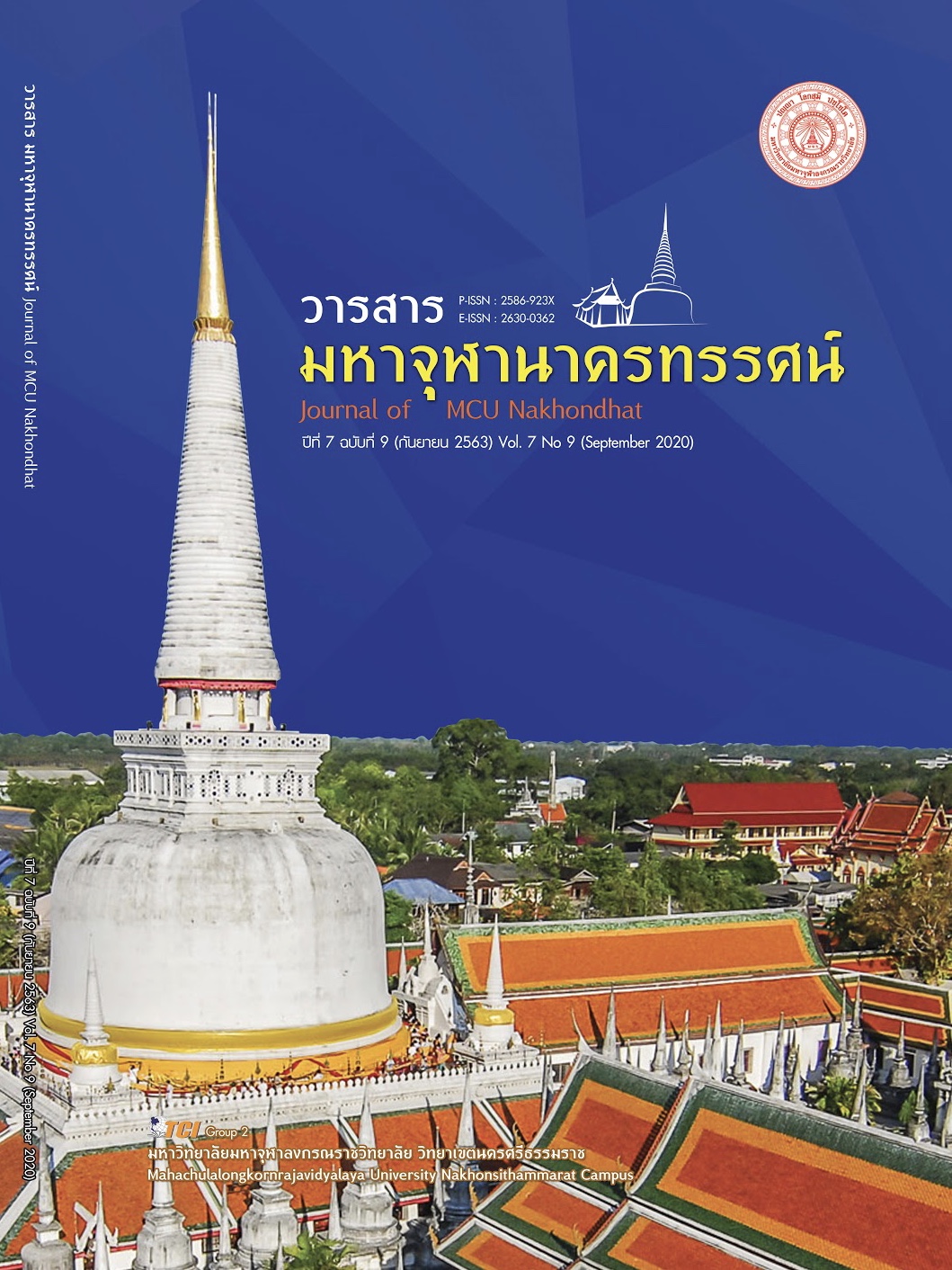LEADERSHIP DEVELOPMENT BY BUDDHIST INTEGRATION FOR JAPANESE AUTOMOTIVE PART BUSINESS ORGANIZATION IN AMATANAKHON INDUSTRIAL ESTATE
Main Article Content
Abstract
This paper has 3 objectives: 1) to study concepts, theories and problems of leadership development; 2) to study Buddhadhamma related to leadership development; 3) to propose a Buddhist integration approach in leadership development for private automotive manufacturing enterprise In the Amata Nakorn Industrial Estate. This is qualitative research by studying relevant documents and in-deep interviews with 18 selected including managers, supervisors and workers additional selected Buddhism experts, analyze data by descriptive analysis then presenting. The results of the research showed that 1) leaders must control their behavior in order to adhere to the leadership's guidelines while being accepted by others. The leadership is what defines good behavior and is the path for the performance of the leader, it must be virtuous. 2) Leadership development using Buddhist principles in Buddhism as a framework for development consists of Virtues of the king, Four sublime states of mind, Four Bases of Power and Four bases of sympathy, which are considered as important tools for applying to life. 3) The Buddhist integrated leadership development approach is Leaders must transcend their leadership to complete leadership, like a faithful leader, in four ways: 3.1) Must understand change 3.2) Leaders have to listen to personnel, to communicate and make their work more effective. 3.3) Leaders are graceful, charming both inside and out. 3.4) to cultivate knowledge, abilities and principles of Buddhism which will lead to complete leadership
Article Details
References
นันทวรรณ อิสรานุวัฒน์ชัย . (2550). ภาวะผู้นําที่พึงประสงค์ในยุคโลกาภิวัตน์: ศึกษาจากหลักพุทธธรม. ใน วิทยานิพนธ์พุทธศาสตรมหาบัณฑิต สาขาวิชาพระพุทธศาสนา. มหาวิทยาลัยจุฬาลงกรณราชวิทยาลัย.
พระครูสิริจันทนิวิฐ (บุญจันทร์ เขมกาโม). (2549). ภาวะผู้นำเชิงพุทธ. กรุงเทพมหานคร: นิติธรรมการพิมพ์.
พระธรรมปิฎก. (2540). พุทธธรรมกับกรพัฒนาชีวิต. กรุงเทพมหานคร: โรงพิมพ์ธรรมสภา.
. (2546). ภาวะผู้นำ: ความสำคัญต่อการพัฒนาคน พัฒนาประเทศ. กรุงเทพมหานคร: โรงพิมพ์ธรรมสภา.
พระศรีปริยัติโมลี (สมชัย กุศลจิตฺโต). (2547). สงฆ์ผู้นำสังคม. กรุงเทพมหานคร: โรงพิมพ์มหาจุฬาลงกรณราชวิทยาลัย.
พัชรี ชำนาญศิลป์. (2557). การพัฒนาภาวะผู้นำเชิงพุทธของผู้บริหารวิทยาลัยการอาชีพเขตภาคเหนือตอนล่าง. ใน ดุษฎีนิพนธ์พุทธศาสตรดุษฏีบัณฑิต สาขาวิชารัฐประศาสนศาสตร์. มหาวิทยาลัยจุฬาลงกรณราชวิทยาลัย .
วรุตน์ ทวีศรี. (2557). การพัฒนาภาวะผู้นำตามหลักธรรม เพื่อการพัฒนาสู่องค์การประสิทธิภาพสูงขอหน่วยงานวิจัยและพัฒนาในสังกัดกระทรวงวิทยาศาสตร์และเทคโนโลยี. ใน ดุษฎีนิพนธ์พุทธศาสตรดุษฏีบัณฑิต สาขาวิชารัฐประศาสนศาสตร์. มหาวิทยาลัยจุฬาลงกรณราชวิทยาลัย.
วันทนา เนาว์วัน. (2557). การพัฒนาภาวะผู้นำตามหลักพุทธธรรม ของบุคลากรโรงเรียนพระปริยัติธรรมแผนกสามัญศึกษา กลุ่ม 3. ใน ดุษฏีนิพนธ์พุทธศาสตรดุษฏีบัณฑิต สาขารัฐประศาสนศาสตร์. มหาวิทยาลัยจุฬาลงกรณ์ราชวิทยาลัย.
สุภางค์พิมพ์ คล้ายธานี. (2557). การพัฒนาภาวะผู้นำในการสื่อสารตามแนวพระพุทธศาสนา. ใน ดุษฎีนิพนธ์พุทธศาสตรดุษฏีบัณฑิต สาขาวิชารัฐประศาสนศาสตร์. มหาวิทยาลัยจุฬาลงกรณ์ราชวิทยาลัย.
สุรพล สุยะพรหม และคณะ. (2555). ทฤษฏีองค์การและการจัดการเชิงพุทธ. พระนครศรีอยุธยา: มหาวิทยาจุฬาลงกรณราชวิทยาลัย.


